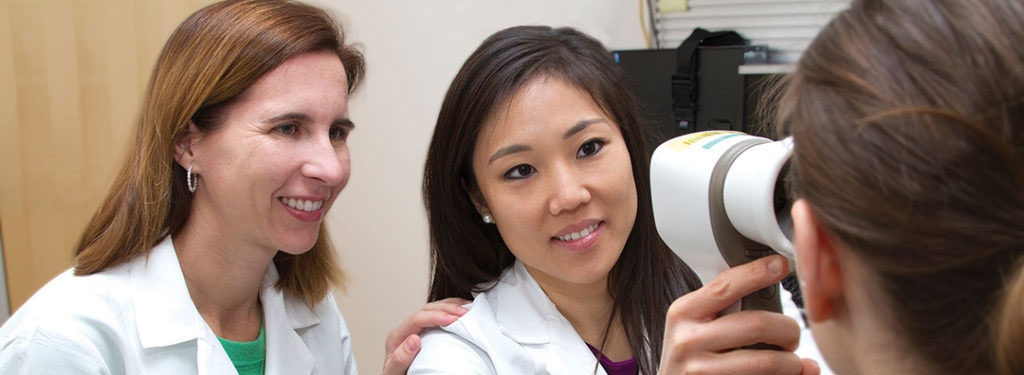
Telemedicine is the remote diagnosis, treatment or prevention of disease using information and communications technology.
In our clinics we are using telemedicine for:
- Diabetic eye disease
- Retinopathy of prematurity (ROP)
- Care / Consultation / Second Opinions
Prior to your telemedicine appointment, you may be asked to take a photo of your eye using your smartphone. Follow these tips to get the best smartphone photo of your eye.
Learn more about Kellogg's eHealth clinical, research and education initiatives at medicine.umich.edu/dept/ophthalmology/centers-programs/ehealth
Diabetic Eye Screening Program
The Kellogg Eye Center for eHealth: Diabetic Eye Screening Program monitors persons with diabetes mellitus for eye disease. Diabetic eye disease can cause vision loss. The American Academy of Ophthalmology and American Diabetes Association recommend annual examinations to monitor for eye changes.
Currently, cameras for diabetic eye screening exams are at the Kellogg Eye Center in Ann Arbor. Soon, these will expand to primary care clinics at the University of Michigan.
Retinopathy of prematurity (ROP) Program
Retinopathy of prematurity (ROP) occurs when abnormal blood vessels grow over the retina and cause blindness in premature babies. ROP happens more often because more babies are surviving at younger ages due to advances in neonatal care. Screening for ROP is challenging because many hospitals do not have children’s eye specialists on staff or nearby. This is a much larger public health problem in developing countries where the neonatal care has improved but ophthalmic expertise in pediatric eye diseases is lacking. ROP telemedicine program allows physicians to send images to be interpreted at larger medical centers, like the U-M Kellogg Eye Center.
Currently, a team of ophthalmologists, led by pediatric retina specialist Cagri G. Besirli, M.D., Ph.D., provides ROP exams and treatment for babies at Sparrow Hospital in Lansing and St. Joseph Mercy Hospital in Ypsilanti. Kellogg also supports an ROP telemedicine screening program with Marquette General Hospital (MGH) in Marquette, Michigan. Babies born before 31 weeks and weighing less than 1,500 grams undergo repeated screenings to monitor for ROP. Photographs of the babies’ eyes are taken using a pediatric retinal camera. Kellogg team routinely evaluates images together or remotely to make follow up and treatment decisions.
Remote Monitoring of Eye Diseases
For patients of the Kellogg Eye Center, there are some clinical diseases that may lend themselves to remote monitoring. Currently, we cannot diagnose eye disease remotely. We can offer care for our current patients via web-based live patient-doctor interactions in select cases. Currently, these are restricted to external eye diseases, such as eyelid diseases or eye movement diseases. If you are a patient of the Kellogg Eye Center, you can ask your Kellogg doctor if you can have a ‘remote’ visit. If they deem it is possible, the Kellogg Eye Center for eHealth will arrange the remote visit.
